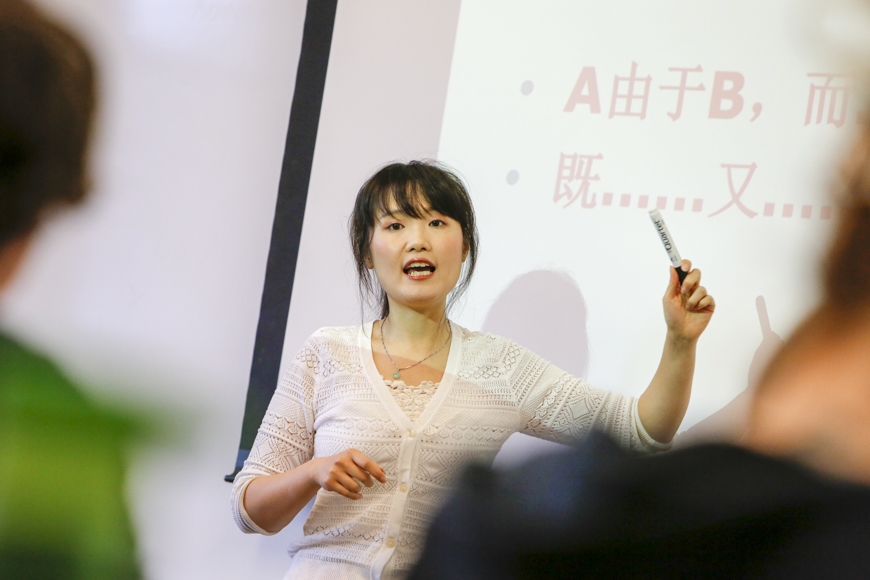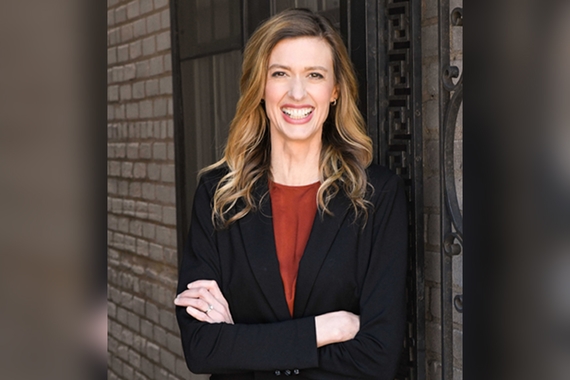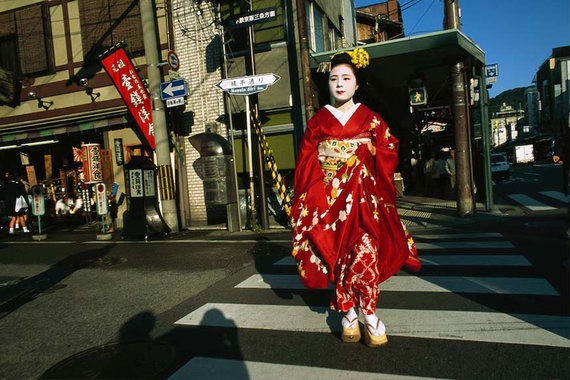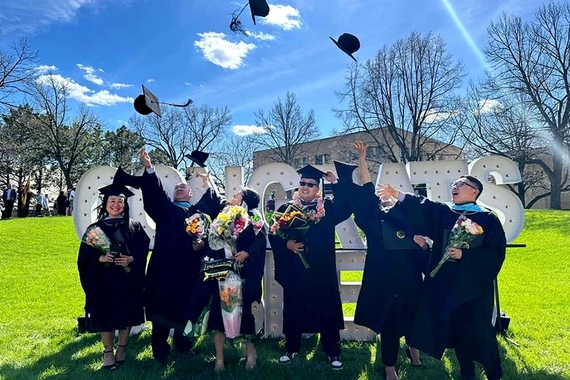All About the New MA Track in Language Pedagogy
Designed to meet the growing demand for teachers of Asian, Middle Eastern, and other less commonly taught languages, our new MA track in language pedagogy prepares students to teach languages at a college or university level. Our program stands out among MA degrees in language pedagogy by including training in cultural analysis through courses in literary, cultural, and media studies in addition to courses on language instruction.
Graduates leave the program with the tools they need to get jobs, including professional experience observing and teaching in real language classrooms and a portfolio that represents their teaching philosophies and includes sample syllabi, lesson plans, and learning activities.
Katrien Vanpee, Director of Arabic Language Instruction, is one of the architects of the new MA track and tells us all about it.
Who is the program for and what's unique about it?
The new MA track in language pedagogy is for students who are interested in teaching world languages, especially at the postsecondary level. A few things set our program apart from other language pedagogy programs. One is the expertise AMES teaching faculty have in language pedagogy, linguistics, and culture specific to our languages. Needless to say, some approaches, principles, and issues in world language pedagogy are relevant to educators regardless of the language they teach. But other important developments and issues in our fields are more language-specific; additionally, teaching Lesson Commonly Taught Languages comes with its own challenges.
As part of their academic preparation, educators in these languages need a firm grounding in their language as a linguistic system, and in the scholarship and professional circuits specific to their languages. Additionally, future employers will want to see teaching experience in the language the future educator intends to teach. In other words, if someone applies for a Japanese teaching position, experience in the teaching of Japanese will be considered a greater asset than, say, a background in the teaching of English, regardless of the value the latter also has.
Our MA in language pedagogy doesn't only equip students with academic and practical expertise in the language(s) they seek to teach, but, additionally, with a firm grounding in the literary and cultural production in those languages. Given how inextricably language, identity, community, and cultural production are entwined, language is not something one teaches in a vacuum, separately from culture. This kind of well-roundedness is important for language educators. Simultaneously, the graduate coursework pedagogy students will complete in literature and culture will enable them to explore specific areas of academic interest beyond those that are strictly pedagogy-focused.
Which languages does this apply to?
Our teaching faculty are veteran educators of Arabic, Chinese, Japanese, Korean, Hindi-Urdu, and Hmong, and have, in the course of their careers, trained many graduate students and instructors in these fields. Our MA in language pedagogy is primarily geared toward students of our these languages. That said, future educators of other African, Middle Eastern, and Asian languages will also find our pedagogy courses of great value. So will future educators of other languages with non-roman alphabets, such as Russian, and languages that are taught less frequently, and typically in small programs, at US colleges and universities.
Is this program open to students in the integrated BA/MA program?
Yes. Undergraduate students who have reached strong proficiency in their focus language can pursue the language pedagogy track as part of our integrated BA/MA program. Students are expected to have at least Advanced-Low proficiency in their language to be eligible. The program is, of course, also open to students who are native speakers of other languages. The benefit of pursuing the pedagogy degree in the integrated BA/MA form is that students can start taking some graduate-level courses in the senior year of their undergraduate career, and then only need one more year to obtain their MA degree. This formula saves students both time and money.
How does this program prepare students for meaningful careers?
As someone who has worked with college-level students for many years, my personal view on this is that teaching adults, many of them young adults preparing to enter their professional lives, is a profoundly fulfilling career. You are working with young people who in many ways already are sophisticated thinkers and who approach the world around them with open eyes, often questioning the status quo. You do so at a time when many of them are exploring what kinds of contributions they want to make to their communities, grounded in the education they have received. Teaching world languages specifically feels—in our globalized, yet at times very divided and inequitable world—particularly meaningful. Many people associate language learning with the ability to communicate well, and appropriately, in the language of communities beyond one’s own. As a form of basic respect for our human diversity and our different ways of being in the world, needless to say, this is pretty fundamental. However, learning languages is about much more than developing what people typically think of as "communication skills." It enables one to start viewing the world, and people's practices, cultural products, and perspectives, in ways beyond those we have grown up with. In every way, shape, and form, learning world languages broadens one's perspective of what it means to be human and to be in the world. From an instructor's perspective, to accompany adult learners on this journey can give tremendous joy—regardless of how involved a world language educator's job tends to be. :)
For those aspiring to teach Asian and Middle Eastern languages at the postsecondary level, a degree like this also adds significantly to one's desirability as a professional. It is still the case that for many of the languages we teach, the number of qualified professionals is less than the need for them. There is significant demand for educators of, for example, Arabic, who have strong academic credentials. For those with such credentials, a variety of exciting career options become viable. One might teach, for example, not just at a college or university, but at a nonprofit or government agency. One might teach in the United States or abroad. Our pedagogy-track students continue to study their language at a high level as part of the MA program and are expected to graduate with at least Advanced-High proficiency. Such professional-level language skills mean that one is very much not limited to a teaching career alone. We live in a time in which people no longer necessarily spend forty years in the same career. But robust expertise in the languages and cultural production of global communities will always open doors to exciting jobs. While this is true at the national and international level, we can also see it right here in our own Twin Cities, which is home to many diverse communities and where many people work in some capacity with immigrants.
What does the MA in Language Pedagogy look like?
The foundational courses our language pedagogy students take include Critical Approaches to Asian and Middle Eastern Studies and Pedagogy for Less Commonly Taught Languages. I will be offering the latter course in spring 2024, so even students who are curious about the pedagogy track but who are undecided can try it out. To ensure they benefit from the pedagogy expertise in various units at our University, our students will also take a course in CEHD's Department of Curriculum and Instruction or at the U's renowned Center for Advanced Research on Language Acquisition (CARLA). In addition to their coursework, students will complete a two-semester teaching practicum with their faculty mentor, who typically is the director of language instruction in their language of focus. That experience will include class observations, reflections, microteaching, and a gradually expanding teaching practice with plentiful feedback. And students will be putting together an extensive teaching portfolio that will include, for example, a strong statement of teaching philosophy, lesson plans, syllabi, and so on. These are materials that a future educator will need to present as part of job applications. As such, the MA program is resolutely career-focused.



